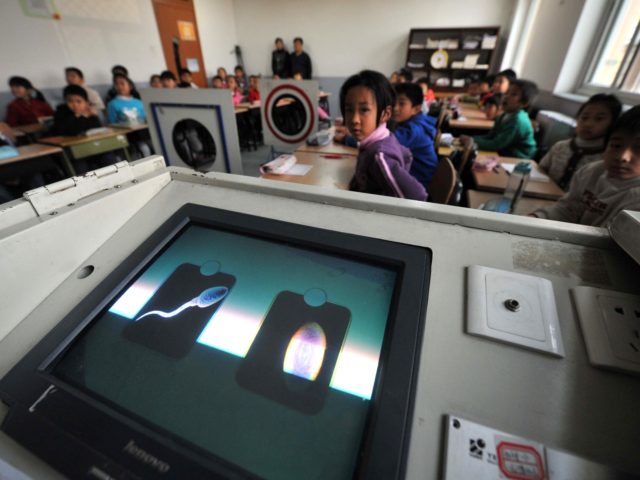Chinese officials are considering implementing sex education classes in primary school, state media revealed on Thursday, to combat the “restraint of Chinese traditional thoughts.”
The state-run Global Times attributed the growing number of calls for a formalized sexual education curriculum in schools a result of an alleged “staggering rise of sexual harassment cases related to minors,” and reported that many health experts in regional Chinese bureaucracy and lawmakers at last week’s “two sessions,” where the Communist Party drafts and approves laws, support the measures.
Outside of sexual crime concerns, the call for “an open and systematic sex education” system in China comes as Beijing struggles to combat the nation’s plummeting birth rate, which continued reaching near-record lows in the past five years despite the end of the communist “one-child policy,” which mandated all women who become pregnant a second time must kill their children, either through abortion or infanticide. China currently imposes a “two-child policy” on its majority Han ethnic group, but few families have taken the opportunity to increase their size.
Recent proposals to help increase the birth rate include “speed dating” programs organized by the Communist Youth League, mandatory family building classes for couples applying for a marriage license, mandatory relationship and family classes in universities, government-funded egg-freezing; and shipping urban women to rural areas with a high percentage of single men. Chinese lawmakers also reportedly railed at the “two sessions” against the alleged “feminization” of Chinese men, defined in part as insufficient loyalty to the Communist Party.
The Global Times noted on Thursday that China already last laws in place mandating sex education in schools, but “the sex education curriculum in China’s compulsory education is still almost absent.”
“Due to the restraint of Chinese traditional thoughts, parents tend to be ashamed of talking about sex in front of their children,” a regional official in China’s Ningxia province told the government newspaper. “However, with the popularity of social media among minors, the content, including sexual violence and sexual abuse is presented in front of our children without supervision.”
China’s internet is heavily regulated; the Communist Party invests heavily in censoring content on social media outlets it finds problematic, particularly content that criticizes the regime. The Times did not indicate that officials discussed further censorship of sexual content online as a solution to the problem of unsupervised exposure of minors to the content.
The Global Times added a warning against “formalism” in sex education, “which might be despised by children,” without elaborating, and claimed the implementation of sex education in schools was highly popular on Chinese social media, where opinions the government disapproves of are immediately erased.
Elsewhere in its coverage of the “two sessions,” the Global Times noted that some lawmakers are seeking government policies to ban “the feminization of male characters in films, TV dramas and other public media.” The article, citing a member of one of the two sessions, the Chinese People’s Political Consultative Conference (CPPCC), defined masculinity as fervent belief in communism, or having a “firm political stance.” Zhang Shuhua, the CPPCC member, complained of too many “feminized men” appearing in popular culture.
The Chinese Communist Party has for years expressed particular concern with Asia’s most popular cultural export, Korean pop music, or K-pop. K-pop boy groups often feature men wearing make-up and elaborately styling their hair. Their music is rarely aggressive and their public images are carefully protected, meaning few have visible romantic relationships. K-pop artists are, however, required to serve in the Korean military, resulting in paparazzi photos of them without their typically manicured outfits and engaging in combat training. Korean is technically at war with North Korea and its ally China, making these images unfavorable to Beijing for political reasons.
Chinese authorities removed Korean entertainers from most available programming in the country in 2016, including with unsophisticated measures like blurring the Korean nationals out of Chinese programs. The move failed to end the popularity of the genre and the currently most successful band in the industry, BTS, remains extremely beloved by Chinese youth. The Communist Party, through outlets like the Global Times, have attempted to smear BTS, largely on the back of statements by a band member thanking the United States military for its support during the Korean War, but the campaign has failed.
Zhang, the Chinese lawmaker, proposed limiting “feminized” images of men in entertainment available to Chinese people and formal education in “masculinity” in schools.
Again, the Global Times did not explicitly link this measure to China’s shrinking birth rate, but Zhang told the outlet, “this feminization reflects a sense of escape and the timidity of some young people who fear normal marriage and love, leading to abnormal values placed on love and marriage, and this will eventually cause a decline in the birth rate.”
China welcomed 10 million newborns to the world in 2020, a 15-percent drop in the birth rate from 2019 and one of the lowest rates on record under communism. In contrast, the birth rate in 2016, the first year of the “two-child policy,” was 17.86 million babies. Chinese observers warned that the current rate is not stable and has declined to an “alarming degree” following the publication of the latest statistics.

COMMENTS
Please let us know if you're having issues with commenting.